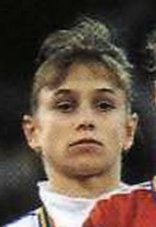
Lavinia Corina Miloșovici is a retired Romanian artistic gymnast. An exceptionally successful athlete on the international competition circuit, Miloșovici, also known as "Milo" in the gymnastics community, is considered to be one of Romania's top gymnasts ever and one of the most prolific female all-around medalists ever, earning a total 19 World Championships or Olympic medals in a span of six years. She medalled in every single World Championships meet, Olympic Games and European Championships between 1991 and 1996, and is only the third female gymnast ever, after Larisa Latynina and Věra Čáslavská, to win at least one World Championships or Olympic title on all four events. Miloșovici was also the last gymnast along with Lu Li to ever receive the perfect mark of 10.0 in an Olympic competition and the last to receive the benchmark score of 9.95 at the World Championships. She was inducted into the International Gymnastics Hall of Fame in 2011. Her trademarks included her four-event mastery, consistency, longevity, versatile skill set, and leadership abilities.
Oana Mihaela Ban is a retired Romanian artistic gymnast. She is an Olympic gold medalist with the team and a world silver medalist on beam and with the team. Her best events were the floor and the balance beam.

Ecaterina Szabo is a former Romanian artistic gymnast who won 20 Olympic, world and continental medals.

Albert Azaryan was a Soviet and Armenian artistic gymnast who competed internationally representing the Soviet Union. He was the 1956 and 1960 Olympic Champion on the still rings. Azaryan was the first gymnast to become an Olympic Champion in rings twice, a feat that Akinori Nakayama would also accomplish twelve years later and that no one else has matched since. He was the first person to do one of the rings most famous variations of the Iron Cross called the Azaryan Cross, which incorporates a quarter turn to the side.

Ioannis Melissanidis is a retired Greek artistic gymnast and the 1996 Olympic champion on the floor exercise. He was also the first Greek gymnast ever to medal at the World Championships. He was named one of the 1996 Greek Male Athletes of the Year.

Tamara Vasilyevna Lazakovich was a Soviet artistic gymnast who competed at the 1972 Summer Olympics.

Ivan Ivankov is a retired Belarusian artistic gymnast. Ivankov; a very big name in the gymnastics world, which he earned throughout years of competition and hard work. The 1994 and 1997 all-around World Champion, and the 1994 and 1996 all-around European Champion, Ivankov has competed for over a decade on the international circuit. Despite his numerous achievements at the World Championships, Europeans and other events, Ivankov has suffered a string of misfortunes at the Olympics, and has never won an Olympic medal. He had to share a third place with another competitor, after which, the bronze Olympic medal wasn’t given to him.

Cristina Bontaş is a Romanian former artistic gymnast, who competed in international events between 1987 and 1993. Her best events were the floor exercise, the vault, and the all around. She is a world champion on floor, a double olympic medalist and a six-time world medalist. Bontaş scored a perfect ten on floor in the all around event of the 1989 World Artistic Gymnastics Championships.

Lavinia Agache is a retired Romanian artistic gymnast. She won 10 medals at major international events, including a team gold medal at the 1984 Olympics and three silver medals at the 1983 World Championships. She is also the 1983 European champion on balance beam.

Mirela Ana Pașca is a retired Romanian artistic gymnast, who competed internationally between 1990 and 1992. She is an Olympic silver medalist and a world bronze medalist with the team. Individually, she is a world bronze medalist and a European champion on uneven bars. She was also an uneven bars finalist at the 1992 Olympic Games.

Camelia Voinea is a retired Romanian artistic gymnast, who competed in international events between 1984 and 1988. She was best known for her powerful tumbling, her innovative 1986–87 floor exercise that featured breakdancing elements, and for being the first gymnast to tumble a double layout to punch front somersault. In 1987 she scored a perfect ten for the floor exercise during the team competition event at the World Championships.
The European Men's Artistic Gymnastics Championships are an annual series of artistic gymnastics championships for male gymnasts from European countries organised by the European Union of Gymnastics. They take place in two biennial formats; in even years they take place in tandem with a junior men's competition, and historically have included a team event, but not an individual all-around. In odd years, they are held in tandem with the European Women's Artistic Gymnastics Championships, and include a team competition. These events are sometimes called the European Individual Artistic Gymnastics Championships. Despite the alternating formats, all winners are considered European champions with one medal table.

The men's horizontal bar competition was one of eight events for male competitors in artistic gymnastics at the 1960 Summer Olympics in Rome. It was held on 5, 7, and 10 September at the Baths of Caracalla. There were 130 competitors from 28 nations, with nations in the team competition having up to 6 gymnasts and other nations entering up to 2 gymnasts. The event was won by Takashi Ono of Japan, the nation's second consecutive victory in the men's parallel bars. Masao Takemoto gave Japan a second medal with his silver. Ono and Takemoto were the third and fourth men to win multiple medals in the parallel bars; Ono was the first to win two gold medals in the event. Boris Shakhlin of the Soviet Union took bronze.

The men's parallel bars competition was one of eight events for male competitors in artistic gymnastics at the 1960 Summer Olympics in Rome. It was held on 5, 7, and 10 September at the Baths of Caracalla. There were 129 competitors from 28 nations, with nations in the team competition having up to 6 gymnasts and other nations entering up to 2 gymnasts. The event was won by Boris Shakhlin of the Soviet Union, the nation's second consecutive victory in the men's parallel bars. Giovanni Carminucci earned Italy's first medal in the event since 1932 with his silver. Takashi Ono of Japan took bronze for a second consecutive Games, making him the fourth man to win multiple medals in the event.

The men's horizontal bar competition was one of eight events for male competitors in artistic gymnastics at the 1956 Summer Olympics in Melbourne. There were 63 competitors from 18 nations, with nations in the team competition having up to 6 gymnasts and other nations entering up to 3 gymnasts. The event was won by Takashi Ono of Japan, with his countryman Masao Takemoto taking bronze. Silver went to Yuri Titov of the Soviet Union. Japan and the Soviet Union each earned their first horizontal bar medals.

The men's parallel bars competition was one of eight events for male competitors in artistic gymnastics at the 1956 Summer Olympics in Melbourne. It was held from 3 to 7 December at the Melbourne Festival Hall. There were 63 competitors from 18 nations, with nations in the team competition having up to 6 gymnasts and other nations entering up to 3 gymnasts. The event was won by Viktor Chukarin of the Soviet Union, the nation's first victory in the parallel bars. Japan took three medals: a silver by Masumi Kubota and bronzes by Takashi Ono and Masao Takemoto. It was the third time a nation had won three medals in the event in the same Games: the United States had swept the medals in 1904 and Switzerland had earned a gold and two bronzes in 1948. Chukarin was the third man to win multiple medals in the parallel bars; Ono would become the fourth in 1960.
The uneven bars at the European Women's Artistic Gymnastics Championships were first held in 1957.
Natalia Georgiyevna Kalinina, is a former artistic gymnast that competed for the Soviet Union and Ukraine. She was a member of the last Soviet world championship team to win a gold medal in 1991. She was the 1990 European champion on the uneven bars. At the 1990 Goodwill Games, she won a medal on every event with 4 golds and 2 silvers, including the all-around gold medal. She was not selected to compete for the Unified Team at the 1992 Summer Olympics. She believes that politics would only allow three gymnasts to come from one republic, and there were already three gymnasts from Ukraine selected.
Kelly Garrison-Funderburk, formerly known as Kelly Garrison-Steves, is a retired American artistic gymnast. An elite gymnast for eight years, she represented the United States at the 1988 Summer Olympics in Seoul, South Korea. In addition to her Olympic experience, she participated in the 1983, 1985 and 1987 World Artistic Gymnastics Championships. She was a two-time winner of the Honda Sports Award.
The Japan men's national artistic gymnastics team is a sport group governed by Japan Gymnastics Association and represents Japan in international gymnastics competitions and multi-sports events. Followed the establishment of All Japan Gymnastics Federation in 1930, the team first appeared at the 1932 Summer Olympics and gradually became the major force till this day. For nearly two decades, from 1960 to 1978, Japanese men was dominant and won every gold medal at the Olympics and World Championships.













